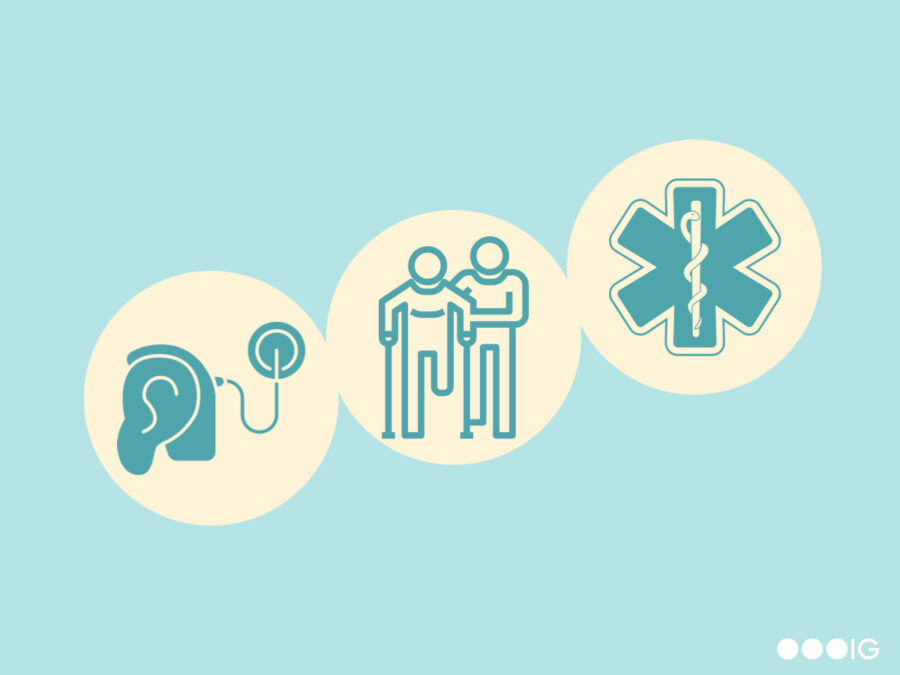Updated December 8, 2023
Comprehensive patient care often requires a team of doctors, nurses and other medical professionals. Still, they can’t do it all alone. Thankfully, allied health professionals are there to help by providing crucial preventative, diagnostic, therapeutic, and administrative services to patients.
Read on for a closer look at key allied health professions and how they support the field of healthcare!
Who are Allied Healthcare Professionals?
Allied health professionals support doctors, dentists, nurses, and pharmacists. Their skills and expertise are crucial in helping diagnose, treat, rehabilitate, and support patients recovering from illnesses, injuries, and surgical procedures.
Allied health workers don’t always directly work with patients or alongside essential providers. Some of them work behind the scenes and aid in the care process by performing crucial tasks, like sterilizing medical equipment, reading X-rays, and assigning the correct codes to medical bills.
Here are some more well-known examples of allied health jobs you may have heard of:
- Phlebotomists
- Radiographers
- Speech and language pathologists
- Dietitians
- Lactation consultants
- Anesthesia technicians
- Medical assistants
- Occupational therapists
- Physician assistants
- Respiratory therapists
- Emergency medical technicians
- Dental hygienists
- Physical therapists
- Audiologists
14 Popular Allied Health Jobs
Allied health professionals make up about 60% of the healthcare workforce in the United States. And the demand for these experts is growing. The Bureau of Health Workforce projects that the employment of allied health professionals will likely increase by up to 30% by the year 2030.
Because allied health serves as an umbrella term for so many specialties, things like job duties and work environment can greatly differ for each role. While it may not be a comprehensive list, we’ve put together a brief guide that dives into some of the most common allied health jobs.
Let’s get started.
1. Phlebotomist
Phlebotomists specialize in collecting blood samples from patients for diagnostic testing, research, blood transfusions, or donations. Phlebotomy is a critical allied health job since the blood specimens they collect are essential for supporting patient medical tests and analyses.
Professional phlebotomists are staffed in any healthcare setting where blood collection and specimen processing are essential, like hospitals, outpatient clinics, urgent care centers, and blood donation centers.
Some of their most common job responsibilities include:
- Comforting patients during the blood collection process
- Ensuring accurate labeling and record-keeping of collected blood samples
- Performing infection control protocols and sterilizing equipment
RELATED: 25+ Phlebotomist Interview Questions
2. Radiographer
In short, radiographers specialize in medical imaging procedures. They perform X-rays, ultrasounds, CT scans, and other imaging procedures to create diagnostic images that help a patient’s healthcare team assess and make informed medical decisions.
Radiographers are found in hospital settings as well as clinics, imaging centers, and some outpatient facilities. Their typical job duties include:
- Patient preparation, like addressing concerns and ensuring proper positioning for imaging
- Capturing diagnostic images using the proper equipment
- Ensuring image quality control and clarity
3. Speech-Language Pathologist
Speech-language pathologists (sometimes referred to as speech therapists) help assess and treat patients with speech, language, communication, and swallowing disorders. They usually work alongside other healthcare professionals, educators, and caregivers to create a holistic treatment plan.
Speech-language pathologists can be found in hospital settings, rehab centers, private practices, and sometimes schools.
Their most common job duties include things like:
- Evaluating patients with speech, language, voice, or swallowing disorders
- Developing tailored treatment plans to address assessment findings
- Collaborating with physicians, nurses, occupational therapists, or caregivers to coordinate comprehensive care
- Educating patients and families on how to support speech and language goals
4. Dietitian
Dietitians specialize in patient nutrition, offering guidance on food and dietary choices to encourage healthy habits. They assess patient’s individual nutritional needs and develop personalized plans that consider health history, lifestyle, dietary preferences, and health goals.
As allied health professionals, dietitians can work collaboratively alongside nurses and physical/occupational therapists. They commonly work in private practices and health clinics but can also be found in long-term care facilities, community health organizations, and even gyms.
Typical job responsibilities for a dietitian include:
- Evaluating patients’ health history, dietary habits, and nutritional needs
- Developing personalized nutrition plans
- Offering medical nutrition therapy or dietary counseling to individuals with medical or weight management needs
- Creating nutritionally balanced meal plans
- Conducting nutritional educational programs
5. Lactation Consultant
A lactation consultant specializes in aiding breastfeeding parents and infants. They offer assistance and guidance to help new parents overcome common breastfeeding challenges and ensure proper latching. These allied health professionals often work alongside obstetricians, pediatricians, nurses, and midwives.
Their common job duties include a combination of:
- Offering breastfeeding techniques and addressing common concerns
- Assessing milk supply and infant weight gain
- Developing customized breastfeeding plans
- Collaborating with healthcare professionals to ensure a coordinated approach to maternal and infant care
6. Anesthesia Technician
Even though anesthesia technicians aren’t permitted to administer anesthesia directly, they’re crucial allied health jobs. They help ensure the proper functioning of equipment all while maintaining a safe environment for the entire anesthesia care team.
Their responsibilities can vary based on the work environment, but some of their common job duties include:
- Preparing patients for anesthesia
- Setup and maintenance of anesthesia equipment, machines, monitors, and airway management devices
- Inventory management of anesthesia supplies, equipment, and medications
- Troubleshooting and mitigating any equipment-related issues
- Ensuring all reusable equipment is sterilized and stored
7. Medical Assistant
Medical assistants are often the first point of contact for patients at healthcare facilities, making them critical allied health professionals.
Basically, medical assistants balance administrative and clinical duties to ensure the smooth operations of the facilities they support. They greet patients and assist during the check-in process, collect insurance information, answer questions, escort patients to rooms, and prepare them for physicians.
They need to be strong communicators so they can support patient processing, collect any necessary vital signs, and assist healthcare providers during examinations.
Medical assistants can be found in various healthcare settings. Some of their common job duties include:
- Patient check-in and appointment scheduling
- Medical records management
- Assisting with health insurance claims processing
- Escorting patients to exam rooms and preparing them or taking vital signs measurements
- Educating patients on post-procedure instructions, medications, or preventative care
8. Occupational Therapist
An occupational therapist helps people with disabilities, injuries, or illnesses participate in their everyday activities and improve their independence. Through their specialized care services, they assist patients in developing, recovering, or improving the skills needed for work and their daily lives.
These professionals may work in a hospital setting, in a patient’s home, or at their own practice. As a part of their job duties, they will usually:
- Perform an evaluation to determine each patient’s needs
- Create an intervention plan with set activities and goals
- Help patients learn and perform skill-building activities
- Educate family members on how to best support the patient
- Recommend special equipment that aids in living independently
9. Physician Assistant
A physician assistant works under the supervision of a primary care doctor, specialist, or surgeon in directly caring for patients. They use their medical expertise to examine, diagnose, and treat patients as needed to help them recover from illnesses, injuries, and surgeries.
Most of these allied healthcare workers find jobs in clinics, hospitals, and outpatient surgical centers. On any given day, a physician assistant will likely:
- Record patients’ symptoms, medical histories, and vital signs
- Perform physical examinations of their patients
- Use their findings and test results to make accurate diagnoses
- Create treatment plans and inform patients about the care process
- Prescribe medication and authorize prescription refills
RELATED: Nurse Practitioner vs. Physician Assistant: What’s the Difference?
10. Respiratory Therapist
A respiratory therapist provides care to people of all ages who are having trouble breathing. They may work with premature infants who need help developing strong lungs, seniors with chronic obstructive pulmonary disease, or anyone experiencing a severe respiratory illness.
Most of these allied health professionals work in state, local, or private hospitals. While moving between the emergency room, intensive care units, and other areas, their job duties are to:
- Examine patients who are experiencing breathing problems
- Complete diagnostic tests to find the right course of treatment
- Perform treatments to clear the airways and improve lung function
- Monitor patients on ventilators to keep delivering oxygen at the correct rate
- Educate patients and families on how to use medical equipment at home
11. Emergency Medical Technician (EMT)
An emergency medical technician (EMT) works as a first responder and, in conjunction with a paramedic, provides lifesaving medical assistance to sick and injured people. Depending on the call, they may need to stabilize the patient, and then provide ongoing aid and monitoring while transporting them to a nearby hospital.
These skilled professionals work in an ambulance and travel to the scene of car accidents and other emergencies as ordered by the 911 operator. Their job duties will vary with each situation but may include:
- Respond to emergencies, ready to act fast and provide medical assistance
- Perform CPR and first aid as needed to stabilize the patients on the scene
- Assess the patient’s condition and determine how to best provide ongoing care
- Monitor vital signs and keep the care process going while in route to the hospital
- Report all their observations to the healthcare staff at the receiving medical center
12. Dental Hygienist
A dental hygienist assists dentists in providing patients with preventative, restorative, and cosmetic dental care services. They directly perform many dental care procedures, including teeth cleanings and x-rays, while keeping patients informed about what to expect.
Most dental hygienists are employed part-time in one or more private dental care clinics. On their workdays, they usually need to perform any or all of these duties:
- Examine patients for any signs of tooth decay or oral diseases
- Perform teeth cleanings to remove plaque and stains
- Take dental X-rays and prepare them for review by the dentist
- Help patients understand the diagnosis and treatment plan
- Educate patients on the best ways to maintain their oral health
13. Physical Therapist
A physical therapist assists patients in improving their movement, range of motion, and mobility while managing their pain levels. Typically, they work with people who have lost their ability to move freely due to chronic health conditions, acute injuries, or illnesses.
Most physical therapists work in a dedicated clinic, although it’s also possible to find jobs at hospitals and residential care facilities. Their daily job duties are likely to:
- Evaluate each patient’s movement, mobility, and range of motion
- Create a treatment plan that restores movement and decreases pain
- Use hands-on therapy, equipment, and exercises to help patients heal
- Provide patients with at-home stretches and exercises for further healing
- Review the patient’s progress in reaching goals and adjust treatments as needed
14. Audiologist
An audiologist examines, diagnoses, and treats patients experiencing hearing loss, balance issues, and other related problems. Depending on the cause and severity of the problem, they may help patients make a full recovery or cope with their condition by using hearing aids or cochlear implants.
Many audiologists work in a private doctor’s office, hospital, or physical, occupational, and speech therapy clinic. As a part of their job duties, they may need to:
- Examine patients who are having trouble hearing or maintaining their balance
- Diagnose acute and chronic conditions affecting the inner, outer, and middle ear
- Create a treatment plan that aligns with the patient’s care preferences and goals
- Fit hearing aids or work with surgeons skilled in placing cochlear implants
- Educate patients and their families on how to best cope with the hearing difficulties
Do You Need New Allied Professionals?
Allied health professionals play a critical role in the healthcare industry by providing essential services that support patient care and overall wellness. From diagnosing and treating injuries to managing chronic conditions, these individuals partner with physicians and other providers to ensure patients receive comprehensive and effective care.
If you need to add a highly skilled allied health professional to your team, we can help you find them. Fill out the form below to get started!
Hiring Allied Health Professionals?
Use Insight Global. Questions? Call us toll-free: 855-485-8853


 by Rie Parker
by Rie Parker


 by Anna Morelock
by Anna Morelock 
 by Brita Long
by Brita Long 
